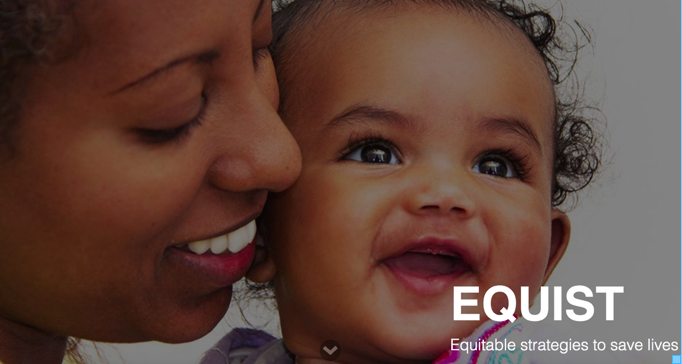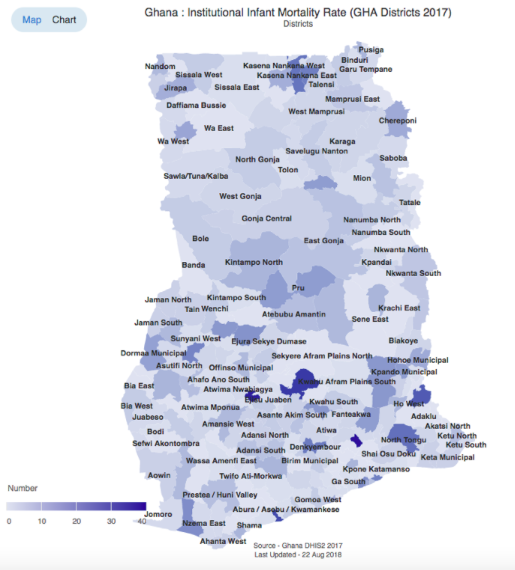|
Seth Davis, Communications Officer, Community Systems Foundation By strengthening national health systems between 2016-2020, 85,000 young lives can be saved in Ghana alone, according to a recent USAID report. [1] However, with limitations in health service delivery, limited accessibility for geographical reasons and poor readiness of health-care facilities, many of the poorest individuals are unable to receive basic health care. [2] To overcome these bottlenecks, UNICEF developed the EQUitable Impact Sensitive Tool (EQUIST) model. Community Systems Foundation (CSF) has partnered in the project for the past two years - translating an Excel-based tool into a robust online platform. To assess the application of the tool within existing health systems, Ministry of Health Officials in Ghana and UNICEF HQ focal points met with CSF technical staff at the Data For All Lab in New Delhi, India. Technical discussions focussed on an assessment of system integration between EQUIST and the existing health management information system (HMIS). Currently, Ghana utilizes a District Health Information System 2 (DHIS2) to manage health data and develop basic health service indicators. Spanning “more than 12,000 system users in 8,000 facilities,” DHIS2 has become an integral part of collecting, managing and analysing health data in the country. [3] This system, while important, is limited in its capacity to apply advanced data modeling techniques to local data. Map is from: http://www.equist.info/en/pages/dashboard In early iterations, UNICEF saw EQUIST as a way for policy-makers to “apply an evidence-based approach to design and review policies and strategies aimed at improving equitable outcomes.” [4] While the tool continues to be leveraged in this way, EQUIST 2.0 was recently launched with “the possibility to use district level data, exchange data with other tools and platforms, and allow visualization of georeferenced information.” [5] Serving as the main contributor for disseminating health equity data at the national and local levels, the full scale integration of EQUIST into existing Ghanaian health data collection will ensure that key bottlenecks in the health sector can be overcome and that all patients are able to receive quality and equitable healthcare. By undergoing the EQUIST Orientation Workshop in New Delhi, Ministry officials in Ghana are now working on identifying indicators that can be exchanged from one system to the other and have learned how EQUIST can be used to develop health policy solutions. With this increased capacity, the workshop will act as a catalyst to improve strategic planning in Ghana and create a more efficient and resilient national health system. 1. USAID. "Acting on the Call: Ending Preventable Child and Maternal Deaths: A Focus on Health Systems." May 2017. Pages 28-29. Accessed at: http://equist.info/files/general_files/GLB_14713glb-5269usaid-2017-aotc-final.pdf
2. World Health Organization. "Identifying implementation bottlenecks for maternal and newborn health interventions in rural districts of the United Republic of Tanzania." April 2015. Accessed at: http://www.who.int/bulletin/volumes/93/6/14-141879/en/ 3. CCM Central. "Interoperable DHIS2-LMIS in Senegal, Tanzania and Ghana: A three-country case study on Supply Chain, EPI Information Systems and integration with DHIS2." April 2017. Page 17. Accessed at: https://ccmcentral.com/wp-content/uploads/2017/10/LMIS-Case-Studies.pdf 4. EQUIST. "EQUIST: EQUitable Impact Sensitive Tool User Guide." December 2017. Pages 15-16. Accessed at: http://www.equist.info/files/general_files/GLB_7834equist-working-paper-jan-2018.pdf 5. EQUIST. "EQUIST: EQUitable Impact Sensitive Tool User Guide." December 2017. Pages 1-2. Accessed at: http://www.equist.info/files/general_files/GLB_7834equist-working-paper-jan-2018.pdf
1 Comment
|
Join the CSF data revolution webinar tomorrow!
COMMUNITY SYSTEMS FOUNDATION – EST 1963
+1 212 500 1335
data-driven sustainable development


